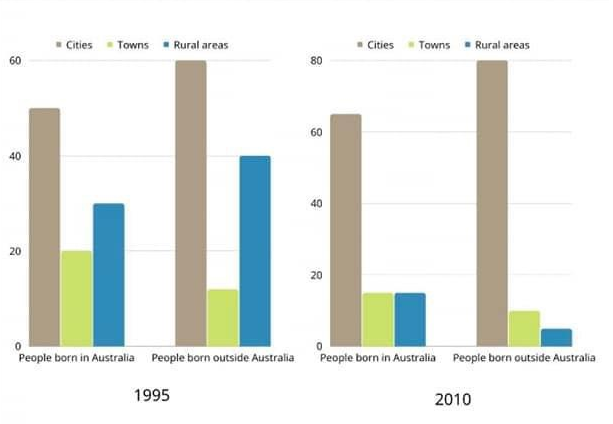[Ankit D] Writing Practice Test 1144980
Task 1
You should spend about 20 minutes on this task.
The bar chart below describes some changes about the percentage of people were born in Australia and who were born outside Australia living in urban, rural and town between 1995 and 2010.
Summarise the information by selecting and reporting the main features and make comparisons where relevant.
You should write at least 150 words.

The bar charts illustrate the percentage of people born inside and outside Australia in cities, towns, and rural areas in the year 1995 and 2010. It is evident that most people were born in cities in both years.
Firstly, in the year 1995, it can be observed that the number of people born in cities (45%) is almost equal to the combined number of people born in towns and rural areas, with rural areas having slightly higher birth rate than towns with a value of 30%. A similar pattern can be seen in the case of people who were born outside the country with cities having 60% birth rate. Although in this case rural areas had a significant higher value than towns with percentages of 40% and 10% respectively.
On the other hand, cities had a significant higher birth rate in the year 2010 in cases of both people born inside and outside Australia with a towering rate of 65% and 80% respectively. In comparison, people born in towns and cities had percentages ranging from merely 5% to 15% each.
Task 2
You should spend about 40 minutes on this task.
Rich countries often give money to poorer countries, but it does not solve poverty. Therefore, developed countries should give other types of help to the poor countries rather than financial aid. To what extent do you agree or disagree?
You should write at least 250 words.
In this era of blooming trades and modernisation, rich countries often provide monetary support to poorer countries to help out with development. Although it is a popular opinion that not only financial but other forms of aid should be provided to help out poorer countries. Although I agree with this opinion, I have some reservations about the ramifications this sort of help might have.
It is true that money cannot solve all problems and often at times depending on a country's state or problems, there are other things that can prove much more beneficial than mere financial support. For example, a country with constant shortage of food supply will have better use of more technological advancements and trades than money. In this case governments of developed countries should aspire to increase trades routes with them instead of just giving them money. This will have long term effects on the country's development.
However, in this case the possibility arises that with constant non-monetary help the poor country might become totally dependent on other countries for their survival and will make no efforts to become self-sufficient in solving their own problems.
To summarize, it is crucial to help out other countries in need. The kind of help plays a major role in defining how the country in need fares in the future. In my opinion, monetary help is the way to go but in cases of dire emergencies like natural disasters, warfare, etc. other form of help might provide a better fighting chance to the affected country.
Community’s feedback
Sorry! We couldn't find any contents.
Score Given by Community
Give a bandscoreLeaderboard:
| # | User | Score | Time | |
|---|---|---|---|---|
| Kento Nanami |  | 8.5 | 52:31 | |
| Nayef Alhajraf |  | 8.5 | 60:00 | |
| Ella Ruppo |  | 7.5 | 59:39 | |
| 4 | chengxi yu |  | 7.0 | 00:00 |
| 5 | avin chui |  | 7.0 | 59:11 |
| 6 | 癫 火 |  | 7.0 | 59:51 |
| 7 | Li Xuefeng |  | 6.5 | 03:46 |
| 8 | Chanisara Wongkongsang |  | 6.5 | 56:37 |
| 9 | Dan H |  | 6.0 | 50:41 |
| 10 | Carlo Di Giacomo |  | 6.0 | 60:00 |



